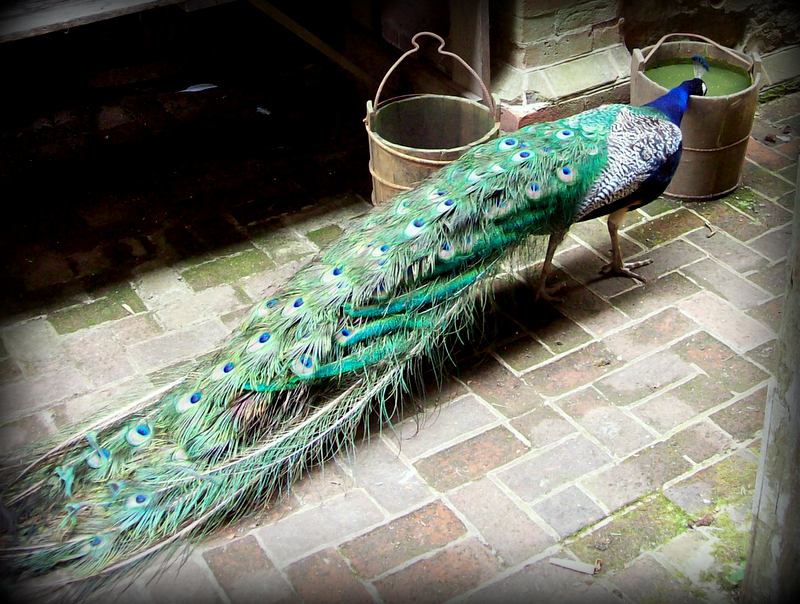Italian Animalistic Expressions Posted by Serena on Jul 26, 2017 in Culture
It all started a couple of weeks ago when we were walking through the beautiful Tudor Kentwell Hall in Suffolk. From out of nowhere, un pavone (a peacock) graciously strolled into the deserted courtyard. It was like being taken back in time to a magical fairytale kingdom.
As the peacock moved around, proudly dragging his splendid plumage behind him, I thought of the verb pavoneggiarsi (to strut like a peacock). This lead me to thinking of the many other Italian verbs that are based on animal-like qualities. Here are some common ones:
Animal: pavone = peacock
Descriptive verb: pavoneggiarsi =to strut, to swagger
Example: la piccola damigella si è pavoneggiata per tutta la cerimonia nel suo vestito nuovo = the little bridesmaid strutted around in her new dress for the whole ceremony
Animal: cane = dog
Descriptive verb: accanirsi = to rage, to persist, to be dogged
Example: il nemico si è accanito contro la città distruggendola = the enemy raged against the town destroying it
Mario si accanisce a coltivare le carote in quel terreno sassono = Mario doggedly persists in cultivating carrots on that stony land
Noun: accanimento = doggedness, tenaciousness
L’esercito si è difeso con accanimento = The army tenaciously defended itself
Animal: gatto = cat
Descriptive verb: sgattaiolare = to slink, to sneak
Example: il ladro è riuscito a sgattaiolare via da una finestra = the thief managed to sneak away through a window
Animal: pollo = chicken
Descriptive verb: appollaiarsi = to perch
Example: Mario si è appollaiato sullo sgabello del bar = Mario perched himself on the bar stool
Animal: scimmia = monkey
Descriptive verb: scimmiottare = to ape, to monkey, to mimic
Example: gli studenti sono stati sorpresi mentre scimmiottavano il maestro = the students were caught mimicking the teacher
Animal: serpente = snake
Descriptive verb: serpeggiare = to wind, to meander, to snake
Example: il sentiero serpeggia fra gli alberi = the path winds through the trees
Animal: cavallo = horse
Descriptive verb: accavallarsi = to pile up, to overlap
Example: le domande mi si accavallavano nella testa = questions were piling up in my head
Animal: pulce = flea
Descriptive verb: spulciare = to comb through, to groom, to examine carefully
Example: la gatta sta spulciando i gattini = the cat is grooming the kittens
ho spulciato tutto il catalogo ma non ho trovato quello che cercavo = I searched through the whole catalogue carefully but I couldn’t find what I was looking for
Animal: formica = ant
Descriptive verb: formicolare = to swarm, to tingle
Example: la folla formicolava per le strade = the crowd swarmed the streets
mi formicola la mano = my hand is tingling
Noun: formicolio = pins and needles
Example: ho un formicolio al piede = I’ve got pins and needles in my foot
Animal: granchio = crab
Descriptive verb: sgranchirsi = to stretch oneself
Example: vado a fare due passi per sgranchirmi le gambe = I’m going for a stroll to stretch my legs
Noun: granchio (colloquial) = cramp
Example: m’ha preso un granchio alla gamba = I’ve got a cramp in my leg
Animal: gufo = (long-eared) owl
Descriptive verb: gufare = to bring bad luck (contemporary jargon)
Example: Non invitate Mario alla partita di calcio, lui gufa sempre! = Don’t invite Mario to the football match, he always brings bad luck!
Animal: civetta = little owl
Descriptive verb: civettare = to flirt (only for women)
Example: a Nella piace civettare coi ragazzi = Nella likes to flirt with the guys
Animal: farfalla = butterfly
Descriptive verb: sfarfallare = to flicker, to be fickle
Example: quella lampadina sta sfarfallando = that light bulb is flickering
gli italiani sfarfallano da un partito politico all’altro = Italians change from one political party to another one
Noun: sfarfallio/sfarfallamento = flickering
Example: lo sfarfallio della lampada al neon mi disturba = the flickering of the neon light disturbs me

Build vocabulary, practice pronunciation, and more with Transparent Language Online. Available anytime, anywhere, on any device.





Comments:
Barbara:
Grazie mille!
Andrea:
Thank you for creating this animated list of words, it’s wonderful!
Kim:
This list is wonderful. It will help make some very difficult verbs easier to remember. Grazie!
Frank:
Molto grazie! This was very helpful.
Heather Sinclair:
Grazie mille! Mi piacciono molto. Devo stupire la mia insegnante e uso ne uno o due!
Jacqui:
Thanks for yet another very useful and interesting lesson